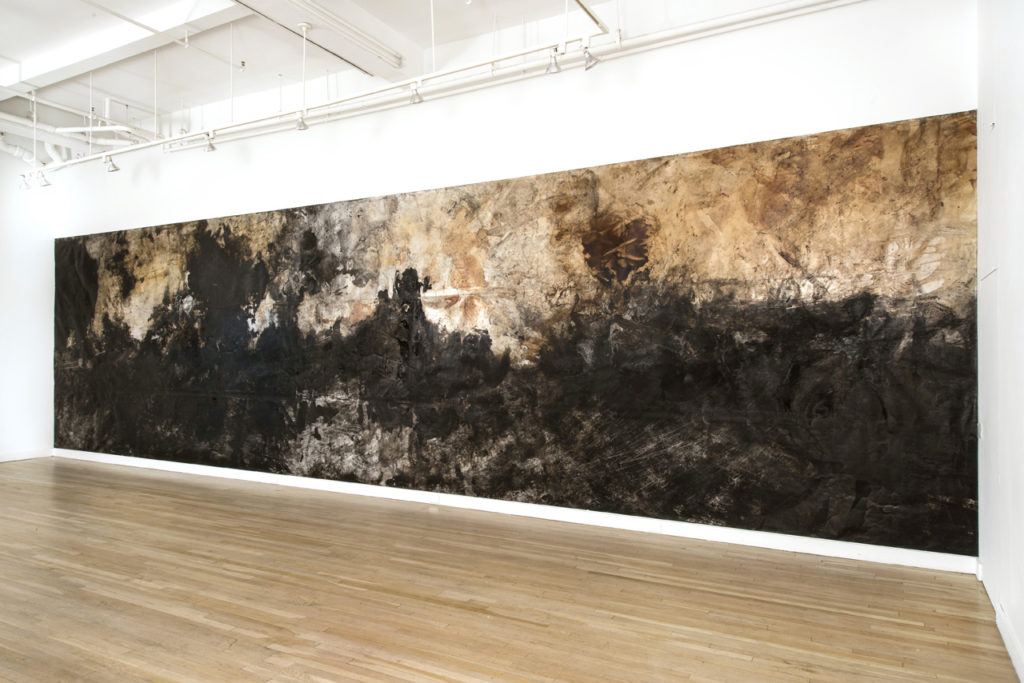Last Friday (February 28th), we had our sixth meeting of the K’acha Willaykuna Our Unlearning Hour. (We meet every Friday, 9:30-10:30am, at the Heirloom Café in the Wexner Center for the Arts – come and join us!). During our meeting, we focused our discussion on a very specific topic: the potential commission by OSU of an artwork by Athena LaTocha (Hunkpapa Lakota/Ojibway). LaTocha is visiting OSU later this week and she will be meeting with the University Arts and Memorials Committee to discuss the commission. Given that the university was in discussions with an Indigenous artist about including their work in the OSU collection, we used our hour together to think through the implications.

Athena LaTocha Untitled 2015, sumi and walnut ink, shellac on paper, 124 x 452 inches
We started by sharing LaTocha’s statement about her work:
Having grown up in Alaska, my understanding of the land was influenced by both the rugged monumentality of the terrain and the impact of the oil and gas industry upon the land. To this day, I feel a natural affinity for places and things that evoke those memories, such as the mountains and deserts of the southwest, and excavation sites and earthmoving equipment found in the industrial landscape.
I unfurl large rolls of paper on the floor and immerse myself in the painting, much like being in the landscape. Working from the inside out, I disperse a palette of earth-toned inks with distilled water and industrial solvents, and use aggressive tools such as wire brushes, scrap metal, and reclaimed tire shreds to push the ink around. Surrounded on all sides by the expanse of paper, I move through the work as if I am traversing the terrain.
Layla Muchnik-Benali expressed her excitement about this commission, but was curious about how we could make the whole commissioning process more transparent and open – as this was the first she’d heard about it. Micah Unzueta proposed that we could use this commission as a mechanism to enact a permanent change to the committee structure, bringing local Indigenous voices to the process. This question of access then turned to nature and location of the work. Anna Freeman, responding to the use of materials by LaTocha in her work and its textured surfaces, wondered there could be a spot that made for people to touch. Lexi Breitenstine, who identified as a ‘science student’, spoke of how great it would be to have an artwork in the area of campus designated for Athena’s work (Zone 6) as it would engage a broader non-artistic audience. She also appreciated how Athena wanted to engage with Indigenous groups in Ohio, using the analogy of a healthcare administrator taking advice from patients. On the abstract nature of LaTocha’s work, Brooke Beeler referenced an article from a class called ‘Rock and Remembrance’ which challenged preconceptions about abstraction in Indigenous art making (is it abstract if colonizers don’t understand it?). Finally, we all discussed whether it should be an aim of the K’acha Willaykuna group to make a proposal to the Art and Memorials Committee for an artwork by an Andean or Amazonian Indigenous artist. Richard Fletcher, who is a member of the committee, agreed to bring these topics to the committee when they meet this week and also to share them with LaTocha directly. As part of her visit, LaTocha will be attending the artist talks in the Fine Arts Library on March 4, 2-3:30pm along with Marti Chaatsmith, Associate Director at the Newark Earthworks Center (NEC) at The Ohio State University at Newark. Stop by and say hello! https://library.osu.edu/events/artists-talks-speaker-marti-chaatsmith-the-fine-arts-library
- For more information on Athena LaTocha’s work, visit her website: https://athenalatocha.com/home.html
Past newsletters will be archived at https://minusplato.com/kacha-willaykuna/newsletters
To subscribe to the K’acha Willaykuna list serve please sign up at https://lists.osu.edu/mailman/listinfo/kachawillaykuna